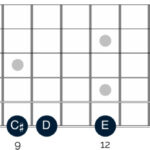Switching to a baritone guitar opens up a world of rich, deep tones, but finding the right strings can be a crucial step in maximizing your instrument’s potential. Many baritone players, especially those new to these guitars, often find themselves experimenting to discover the strings that truly resonate with their playing style and desired sound. This exploration is essential, as the stock strings on a new baritone guitar might not always be the ideal match for every player.
One common starting point for baritone guitars is the D’Addario EXP set. While these strings are widely available and a decent starting point, some players find them lacking in certain areas. For instance, the feel of EXP strings can be less than ideal for fingerstyle players who use nails, sometimes producing unwanted noise. Furthermore, some musicians seek a fuller, more robust sound, particularly from the higher strings, to complement the inherent richness of the baritone guitar’s lower register.
Seeking an alternative, many baritone guitarists turn to brands like Elixir, which offers a dedicated baritone set. Elixir strings are known for their coated strings, which extend string life and reduce finger noise. Moving to an Elixir baritone set can be a step up for those dissatisfied with standard uncoated strings, providing a different feel and potentially improved tonal characteristics.
However, the journey doesn’t always end with off-the-shelf sets. Some players, in pursuit of a very specific sound and feel, venture into customizing their string gauges within a set. A common modification is replacing the plain steel strings in a standard set with wound strings. This can significantly alter the tonal balance and playability of the baritone.
For example, experimenting with wound strings on the higher courses of a baritone can bring a noticeable difference. Replacing the plain steel second string with a wound .022 gauge string, and the plain steel first string with a lighter gauge wound string, such as a .017 nickel wound, can create a warmer, rounder tone on these strings. This modification can be particularly beneficial for fingerstyle playing and for players who frequently use open tunings.
Open tunings are popular among baritone players, allowing for unique voicings and sonic textures. A common approach is to tune a baritone to open D (A-D-A-D-F#-A), which is a whole step lower than standard open G. This tuning often leads to tuning the 1st and 6th strings to “A,” creating a resonant and harmonically rich sound. When using a wound .017 first string, it’s important to note that tuning up to “B” in standard baritone tuning (B-E-A-D-F#-B) might be too much tension and could risk breaking the string. In such cases, adapting to an A-A tuning (A-D-G-C-E-A), a whole step down from standard baritone tuning, can be a practical solution while still maintaining familiar chord shapes.
Ultimately, the quest for the perfect Baritone Guitar Strings is a personal one. Experimenting with different brands, gauges, and even string types like wound versus plain strings is key to unlocking the full potential of your baritone guitar and tailoring its sound to your individual musical preferences and playing style.

